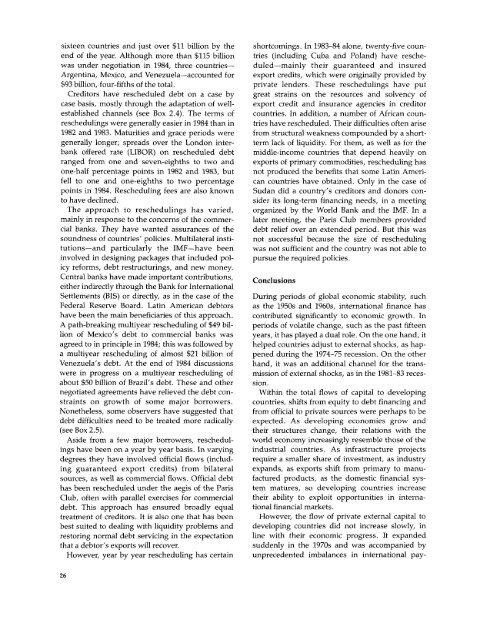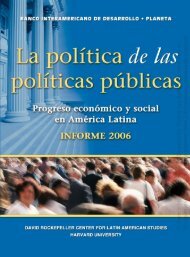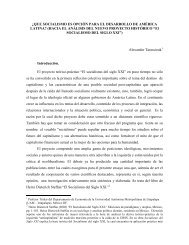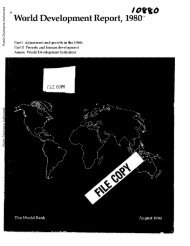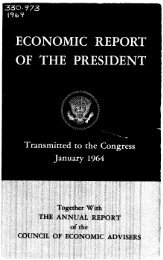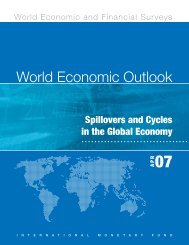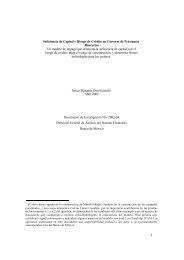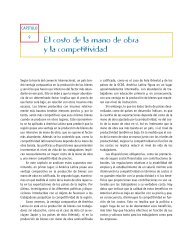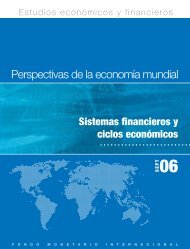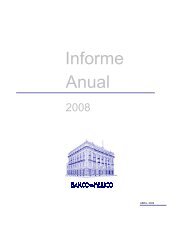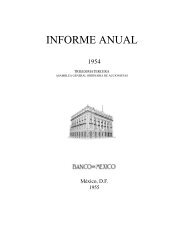World Bank Document
World Bank Document
World Bank Document
You also want an ePaper? Increase the reach of your titles
YUMPU automatically turns print PDFs into web optimized ePapers that Google loves.
sixteen countries and just over $11 billion by the shortcomings. In 1983-84 alone, twenty-five counend<br />
of the year. Although more than $115 billion tries (including Cuba and Poland) have reschewas<br />
under negotiation in 1984, three countries- duled-mainly their guaranteed and insured<br />
Argentina, Mexico, and Venezuela--accounted for export credits, which were originally provided by<br />
$93 billion, four-fifths of the total. private lenders. These reschedulings have put<br />
Creditors have rescheduled debt on a case by great strains on the resources and solvency of<br />
case basis, mostly through the adaptation of well- export credit and insurance agencies in creditor<br />
established channels (see Box 2.4). The terms of countries. In addition, a number of African counreschedulings<br />
were generally easier in 1984 than in tries have rescheduled. Their difficulties often arise<br />
1982 and 1983. Maturities and grace periods were from structural weakness compounded by a shortgenerally<br />
longer; spreads over the London inter- term lack of liquidity. For them, as well as for the<br />
bank offered rate (LIBOR) on rescheduled debt middle-income countries that depend heavily on<br />
ranged from one and seven-eighths to two and exports of primary commodities, rescheduling has<br />
one-half percentage points in 1982 and 1983, but not produced the benefits that some Latin AmeTifell<br />
to one and one-eighths to two percentage can countries have obtained. Only in the case of<br />
points in 1984. Rescheduling fees are also known Sudan did a country's creditors and donors conto<br />
have declined.<br />
sider its long-term financing needs, in a meeting<br />
The approach to reschedulings has varied, organized by the <strong>World</strong> <strong>Bank</strong> and the IMF. In a<br />
mainly in response to the concerns of the commer- later meeting, the Paris Club members provided<br />
cial banks. They have wanted assurances of the debt relief over an extended period. But this was<br />
soundness of countries' policies. Multilateral insti- not successful because the size of rescheduling<br />
tutions-and particularly the IMF-have been was not sufficient and the country was not able to<br />
involved in designing packages that included pol- pursue the required policies.<br />
icy reforms, debt restructurings, and new money.<br />
Central banks have made important contributions, Conclusions<br />
either indirectly through the <strong>Bank</strong> for International<br />
Settlements (BIS) or directly, as in the case of the During periods of global economic stability, such<br />
Federal Reserve Board. Latin American debtors as the 1950s and 1960s, international finance has<br />
have been the main beneficiaries of this approach. contributed significantly to economic growth. In<br />
A path-breaking multiyear rescheduling of $49 bil- periods of volatile change, such as the past fifteen<br />
lion of Mexico's debt to commercial banks was years, it has played a dual role. On the one hand, it<br />
agreed to in principle in 1984; this was followed by helped countries adjust to external shocks, as hapa<br />
multiyear rescheduling of almost $21 billion of pened during the 1974-75 recession. On the other<br />
Venezuela's debt. At the end of 1984 discussions hand, it was an additional channel for the transwere<br />
in progress on a multiyear rescheduling of mission of external shocks, as in the 1981-83 recesabout<br />
$50 billion of Brazil's debt. These and other sion.<br />
negotiated agreements have relieved the debt con- Within the total flows of capital to developing<br />
straints on growth of some major borrowers. countries, shifts from equity to debt financing and<br />
Nonetheless, some observers have suggested that from official to private sources were perhaps to be<br />
debt difficulties need to be treated more radically expected. As developing economies grow and<br />
(see Box 2.5).<br />
their structures change, their relations with the<br />
Aside from a few major borrowers, reschedul- world economy increasingly resemble those of the<br />
ings have been on a year by year basis. In varying industrial countries. As infrastructure projects<br />
degrees they have involved official flows (includ- require a smaller share of investment, as industry<br />
ing guaranteed export credits) from bilateral expands, as exports shift from primary to manusources,<br />
as well as commercial flows. Official debt factured products, as the domestic financial syshas<br />
been rescheduled under the aegis of the Paris tem matures, so developing countries increase<br />
Club, often with parallel exercises for commercial their ability to exploit opportunities in internadebt.<br />
This approach has ensured broadly equal tional financial markets.<br />
treatment of creditors. It is also one that has been However, the flow of private external capital to<br />
best suited to dealing with liquidity problems and developing countries did not increase slowly, in<br />
restoring normal debt servicing in the expectation line with their economic progress. It expanded<br />
that a debtor's exports will recover.<br />
suddenly in the 1970s and was accompanied by<br />
However, year by year rescheduling has certain unprecedented imbalances in international pay-<br />
26


